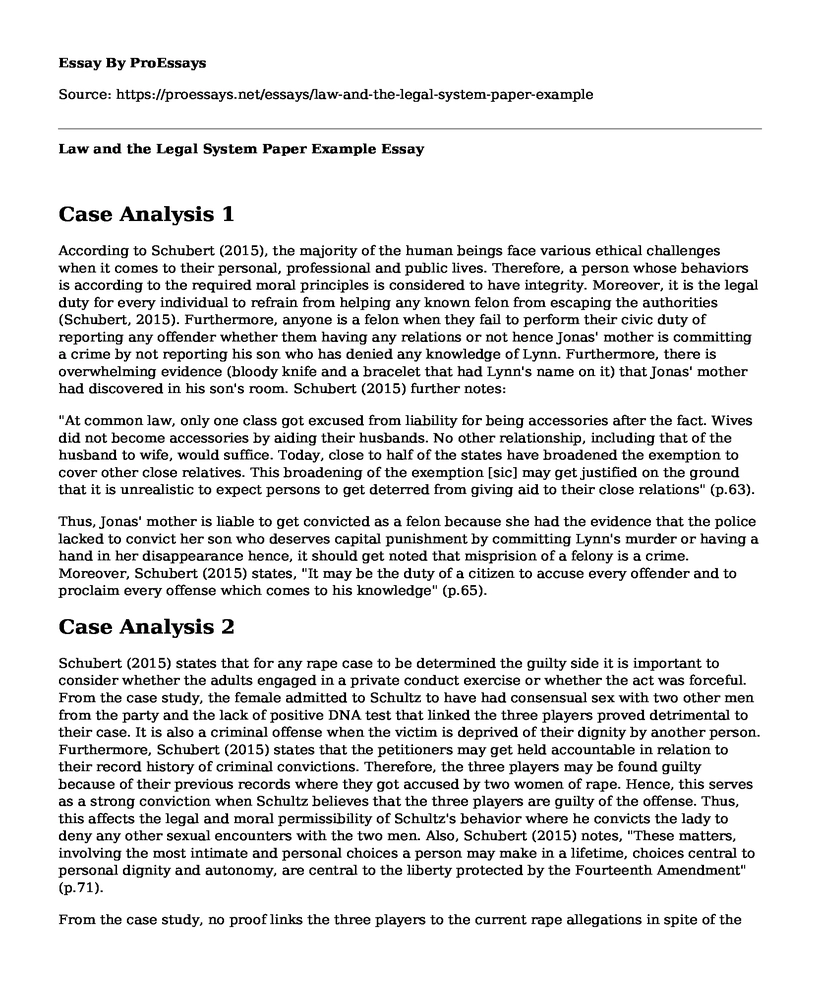Case Analysis 1
According to Schubert (2015), the majority of the human beings face various ethical challenges when it comes to their personal, professional and public lives. Therefore, a person whose behaviors is according to the required moral principles is considered to have integrity. Moreover, it is the legal duty for every individual to refrain from helping any known felon from escaping the authorities (Schubert, 2015). Furthermore, anyone is a felon when they fail to perform their civic duty of reporting any offender whether them having any relations or not hence Jonas' mother is committing a crime by not reporting his son who has denied any knowledge of Lynn. Furthermore, there is overwhelming evidence (bloody knife and a bracelet that had Lynn's name on it) that Jonas' mother had discovered in his son's room. Schubert (2015) further notes:
"At common law, only one class got excused from liability for being accessories after the fact. Wives did not become accessories by aiding their husbands. No other relationship, including that of the husband to wife, would suffice. Today, close to half of the states have broadened the exemption to cover other close relatives. This broadening of the exemption [sic] may get justified on the ground that it is unrealistic to expect persons to get deterred from giving aid to their close relations" (p.63).
Thus, Jonas' mother is liable to get convicted as a felon because she had the evidence that the police lacked to convict her son who deserves capital punishment by committing Lynn's murder or having a hand in her disappearance hence, it should get noted that misprision of a felony is a crime. Moreover, Schubert (2015) states, "It may be the duty of a citizen to accuse every offender and to proclaim every offense which comes to his knowledge" (p.65).
Case Analysis 2
Schubert (2015) states that for any rape case to be determined the guilty side it is important to consider whether the adults engaged in a private conduct exercise or whether the act was forceful. From the case study, the female admitted to Schultz to have had consensual sex with two other men from the party and the lack of positive DNA test that linked the three players proved detrimental to their case. It is also a criminal offense when the victim is deprived of their dignity by another person. Furthermore, Schubert (2015) states that the petitioners may get held accountable in relation to their record history of criminal convictions. Therefore, the three players may be found guilty because of their previous records where they got accused by two women of rape. Hence, this serves as a strong conviction when Schultz believes that the three players are guilty of the offense. Thus, this affects the legal and moral permissibility of Schultz's behavior where he convicts the lady to deny any other sexual encounters with the two men. Also, Schubert (2015) notes, "These matters, involving the most intimate and personal choices a person may make in a lifetime, choices central to personal dignity and autonomy, are central to the liberty protected by the Fourteenth Amendment" (p.71).
From the case study, no proof links the three players to the current rape allegations in spite of the two previous cases that were reported by the two women. Also, the DNA test that got conducted on the three players found none guilty of the rape case allegations.
Case Analysis 3
According to Schubert (2015), an individual can get found guilty if they are liable for concealment and fraudulent misrepresentation. Hence, it was unlawful for Michelle using the money which did not lawfully belong to her which led to the delay in which the money got returned after three days. Therefore, the Due Process Clause may be implemented by objective standards that do not require proof of actual bias. Schubert (2015) states, "Under a realistic appraisal of human weakness and psychological tendencies which may pose a risk as prejudgment or actual bias" (p.81). Hence, Michelle may not have had an ill intent when she submitted the money three days later or used the money, but it is still an offense that is punishable by law.
References
Schubert, F. A. (2015). Introduction to law and the legal system. Retrieved from: https://vsaccess.vitalsource.com/#/books/9781337568463/cfi/85!/4/4@0.
Cite this page
Law and the Legal System Paper Example. (2022, Jul 25). Retrieved from https://proessays.net/essays/law-and-the-legal-system-paper-example
If you are the original author of this essay and no longer wish to have it published on the ProEssays website, please click below to request its removal:
- Definition and Purpose of Exclusionary Rule - A Research Paper Example
- Essay on Kent State Shooting
- Quick Guide to Report Writing
- The Way Illegal Immigrants Phase Criminal Injustices While Being Undocumented in the U.S
- Media Exposure and Violent Crimes - Essay Sample
- Criminal Justice System: Racially Biased and Problematic - Free Research Paper Sample
- Free Essay Sample on Parenting and Juvenile Delinquency







